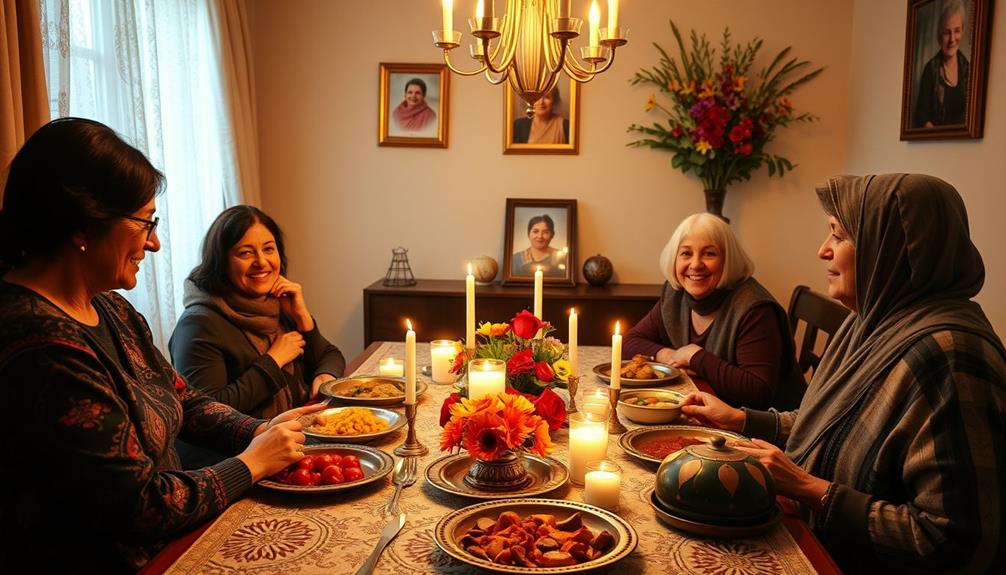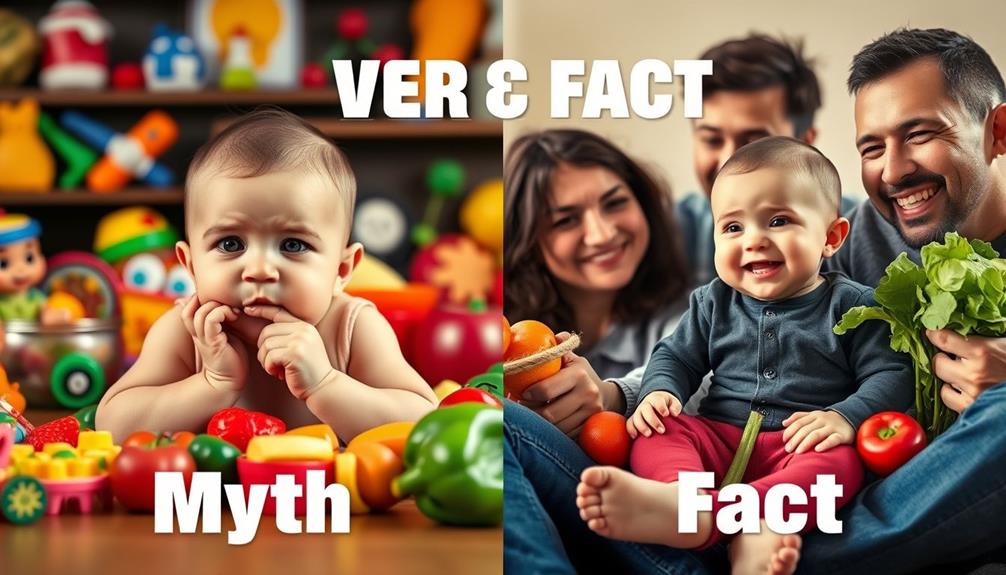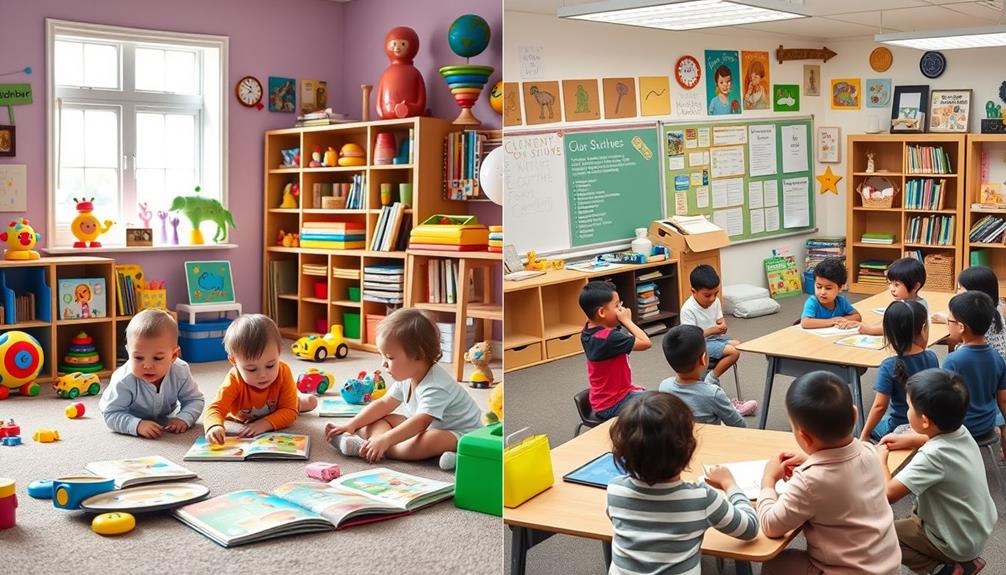You can honor your deceased mother's memory by incorporating various heartfelt birthday traditions from around the world. In China, you might enjoy longevity noodles, while in South Korea, you could prepare seaweed soup, symbolizing maternal care. Celebrating with favorite foods and sharing stories helps keep her spirit alive, fostering togetherness among loved ones. You could also decorate her grave with flowers or balloons, creating a festive atmosphere. Engaging in creative activities, like making memory boxes or holding themed dinners, deepens your connection and honors her legacy. Discovering more about these customs can inspire meaningful ways to celebrate her life.
Key Takeaways
- In China, longevity noodles symbolize long life and celebrate memories of deceased mothers during birthday gatherings.
- Mexican Día de los Muertos includes piñatas and favorite meals to honor and remember cherished maternal figures.
- South Koreans enjoy seaweed soup (miyeok-guk) on birthdays, linking the dish to maternal care and nurturing traditions.
- In Italy, personalized cakes or pies are created to celebrate the birthdays of deceased mothers, ensuring their memory lives on.
- Family gatherings often feature shared stories and favorite foods, fostering connection and remembrance of mothers who have passed away.
Global Birthday Customs
Throughout the world, birthday customs vary widely, reflecting unique cultural values and traditions. When considering birthday traditions, many cultures emphasize the importance of food and communal activities, which can also serve as a way to honor deceased loved ones.
For instance, in China, people often indulge in longevity noodles, symbolizing long life, which can remind you of those who once celebrated their birthdays with you. Additionally, the use of essential oils for relaxation, such as lavender and chamomile, can create a soothing atmosphere during such commemorative gatherings, enhancing the experience of remembering loved ones through essential oil blends for relaxation.
In Mexico and other Latin American countries, there's the lively piñata tradition, where participants joyfully strike a decorated object to release treats, fostering community spirit and shared memories of celebrations that may include honoring those who've passed.
In Germany, you might find the birthday person baking their own cake, a practice that reinforces pride and community involvement.
Meanwhile, South Koreans traditionally enjoy seaweed soup (miyeok-guk) on their birthdays, a dish linked to health and nurturing—perfect for remembering how a deceased mother cared for her family.
Lastly, in Vietnam, the focus on Tet as the main celebration highlights a communal sense of age and remembrance, allowing you to reflect on the lives of your deceased loved ones during this time.
Celebrating With Family and Friends

When you gather with family and friends to celebrate your mother's birthday, it's a chance to share stories and memories that keep her spirit alive.
Incorporating her favorite foods and activities can make the day feel special and personal.
Additionally, engaging in heartfelt discussions about grief and memory can provide emotional support, reminiscent of the importance of emotional support during challenging times.
These moments not only honor her legacy but also strengthen the bonds among those who loved her.
Family Gathering Activities
Celebrating a deceased mother with family and friends can be a poignant yet uplifting experience. Gather your loved ones to honor her memory by preparing her favorite foods. Sharing these meals not only evokes fond recollections but also strengthens your connection with each other.
During the gathering, encourage everyone to share stories and memories. This creates a comforting environment where family members can process grief collectively while celebrating her life. You might also incorporate traditions, like singing her favorite songs or engaging in activities she enjoyed, to enhance the celebratory atmosphere.
Recognizing the mix of emotions during the event is important. Open discussions allow everyone to express their feelings and support one another, making the experience even more meaningful.
Consider creating a memorial space, such as a photo display or a memory box, where family members can contribute personal memories and keepsakes.
These family gathering activities not only honor your loved one's birthday but also foster a sense of togetherness, reminding you all of the lasting impact she'd on your lives. Embrace the moment, and celebrate the love that continues to bind you all together.
Sharing Memories Together
Your loved one's birthday can be a powerful opportunity to share memories that celebrate her life and legacy. Gathering with family and friends on this special day helps foster connection, making the day feel less intimidating and isolating.
Engage in activities she enjoyed, like cooking her favorite meal or playing her favorite games. These joyful moments not only honor her memory but also create a warm atmosphere.
Consider hosting a gathering where everyone shares their fond memories and stories. This reinforces the bonds between family and friends, creating a sense of solidarity during a difficult time.
If some loved ones can't be there physically, utilize social media to share memories, photos, and messages, allowing them to participate in celebrating your loved one from afar.
You could also organize a communal act of remembrance, like a charity donation in her name. This not only honors her legacy but also promotes healing and purpose among those grieving.
Culinary Traditions for Remembrance

Culinary traditions serve as a poignant way to remember and honor deceased mothers, allowing families to connect with their past while celebrating their loved ones' lives. In Mexico, families prepare their mothers' favorite meals during Día de los Muertos, creating a feast that resonates with cherished memories.
Similarly, in South Korea, serving seaweed soup, or miyeok-guk, on birthdays symbolizes nourishment and reflects the bond between mothers and children.
In Vietnam, special dishes are offered during Tet, a time dedicated to honoring mothers' contributions and love. Italian families often bake personalized cakes or pies for their deceased mothers' birthdays, emphasizing the importance of food in family traditions.
Meanwhile, in the Philippines, a festive feast featuring favorite foods of the departed transforms birthdays into a celebration of life, allowing loved ones to gather and remember your loved one through shared meals.
These culinary practices not only act as a birthday present for the spirit of your mother but also help keep her memory alive in your heart and home.
Creative Memorial Activities

Many families find solace in creative memorial activities that honor their deceased mothers, providing a meaningful way to keep their memories alive.
One touching way to celebrate your loved one is by crafting a scrapbook or memory box filled with cherished moments and mementos, similar to the celebration of special occasions that can bring loved ones together. This tangible keepsake can serve as a beautiful reminder of all the special times you shared.
Another heartfelt tribute involves balloon releases. Write personal messages to your mother, attach them to balloons, and release them into the sky. This act not only fosters a sense of connection but also turns grief into a moment of shared remembrance.
Organizing family gatherings is another way to celebrate your loved one. Sharing favorite foods and stories creates a joyful atmosphere, allowing everyone to reflect on the life and legacy of your mother together.
Visiting and Decorating Graves

Visiting and decorating graves is a poignant way to honor the memory of your deceased mother, transforming a somber space into a celebration of her life. This heartfelt tradition allows you to bring flowers, personal items, and decorations to her final resting place, creating a vibrant atmosphere.
Gathering with family at the grave site fosters connection, as you share stories and reminisce about cherished moments. On special occasions like birthdays, you can add festive touches such as balloons, birthday hats, and her favorite foods, making the site feel joyous.
Here's a closer look at some common practices associated with grave decoration:
| Activity | Description |
|---|---|
| Bringing Flowers | Fresh flowers symbolize love and remembrance. |
| Sharing Memories | Telling stories creates a shared sense of connection. |
| Birthday Decorations | Balloons and hats add a celebratory touch. |
| Lighting Candles | Candles symbolize guidance for the spirit. |
| Personal Items | Items that reflect her personality show love. |
Engaging in these traditions not only honors her memory but also offers emotional healing as you reflect on the ongoing love you share.
Symbolic Acts of Remembrance

Honoring your mother's memory on her birthday can also involve symbolic acts of remembrance that go beyond visiting her grave. You can create a heartfelt tribute by decorating her resting place with flowers and personal items, reflecting your love and cherished memories. Engaging in activities she enjoyed, like cooking her favorite meal or participating in a shared hobby, serves as a meaningful celebration of her life and your bond.
Understanding the complexities of your relationship, especially if she'd traits associated with BPD push-pull dynamics, can also deepen this remembrance.
Consider organizing a family gathering where loved ones can share stories, enjoy her favorite foods, and listen to her beloved music. This not only fosters connection among family members but also keeps her spirit alive in the hearts of those who knew her.
You might also try balloon releases, writing messages to her that you send skyward, symbolizing your thoughts and love reaching her.
Additionally, participating in charitable acts in her name—like donating to causes she cared about—creates a lasting impact and honors her legacy.
These symbolic acts of remembrance allow you to express your love while celebrating her life in ways that resonate deeply within your family and community.
Personalizing Celebrations

Personalizing celebrations for your deceased mother can make her birthday feel special and meaningful. You might consider incorporating her favorite foods, music, or activities that she loved, creating a unique atmosphere filled with cherished memories.
For instance, you could include her favorite meal while being mindful of any dietary restrictions she may have had, similar to how cat health and nutrition emphasizes understanding dietary needs.
Adding custom decorations or engaging in her favorite hobbies can deepen your connection and honor her legacy in a heartfelt way.
Unique Memorial Activities
How can you turn a day of sorrow into one of joyful remembrance? By engaging in unique memorial activities that celebrate your mother's life, you can create a heartfelt tribute. Gather family and friends to share stories and favorite dishes that she loved, fostering a sense of community support. You might also consider decorating her grave with flowers, balloons, and personal mementos, making your love tangible.
Here's a table of ideas to inspire your celebration:
| Memorial Activity | Description |
|---|---|
| Favorite Foods | Cook and share dishes your mother loved. |
| Hobbies | Engage in activities she enjoyed, like painting. |
| Memory Boxes | Create boxes filled with cherished keepsakes. |
| Family Gatherings | Organize gatherings to share stories and laughter. |
| Scrapbooks | Compile a scrapbook with photos and memories. |
These activities not only honor her memory but also help you feel connected to her legacy. By personalizing these celebrations, you can transform grief into a beautiful celebration of love and remembrance.
Incorporating Personal Touches
Creating a celebration that reflects your mother's unique spirit can make her birthday feel special and meaningful. Personalizing celebrations allows you to honor her memory in a way that resonates with you and your loved ones.
Start by incorporating her favorite foods, music, and colors to create an atmosphere that embodies her personality. This thoughtful approach sets the tone for a heartfelt gathering.
Engage your family by creating custom birthday hats or decorations, adding a unique touch that feels tailored to her memory. Share stories and memories during your celebration; this fosters connection and lets everyone reminisce about the joy she brought to your lives.
Consider including symbolic gestures like lighting candles or releasing balloons with written messages to provide a poignant tribute. These small acts can make a big impact, allowing loved ones to feel her presence.
Lastly, engaging in her favorite hobbies—like painting or gardening—can help you feel closer to her while celebrating her life. By incorporating these personal touches, you guarantee that her birthday remains a cherished occasion filled with love, remembrance, and connection.
Sharing Stories and Memories

A mother's stories and memories serve as a powerful way to keep her spirit alive, especially on birthdays when emotions can run high. Sharing stories about her can foster a sense of connection among family and friends, helping to alleviate feelings of isolation on significant dates.
Engaging in storytelling allows you to reflect on cherished moments, creating a comforting atmosphere during celebrations. This practice can also enhance personal confidence and self-image, similar to how astrology influences perceived attractiveness in our lives star appeal in relation to societal beauty standards.
You can communicate these memories through social media posts, family gatherings, or intimate conversations. Each shared memory provides an opportunity for emotional support and shared experiences, reinforcing bonds with those who understand your grief.
Incorporating favorite anecdotes or traits of your mother into birthday celebrations enhances the event, making it a meaningful tribute that honors her life and legacy. This practice not only offers comfort but also promotes healing.
Discussing memories helps you process your grief while celebrating the love you shared with her. As you share stories, remember that each one holds a piece of her spirit, and reliving those moments can remind you that her influence continues to shape your life.
Embrace this tradition; it's an essential part of keeping her memory alive.
Community Support in Grief

When you lose a mother, leaning on your community can make a world of difference in your healing journey.
Participating in shared remembrance activities and group gatherings allows you to celebrate her life while connecting with others who understand your pain.
Engaging in authentic connections through these gatherings can foster a supportive environment.
Together, you can foster a sense of togetherness that helps everyone navigate their grief.
Shared Remembrance Activities
Many people find comfort in community gatherings that focus on remembrance, especially during significant occasions like birthdays. These events allow you to share stories and experiences about your deceased loved ones, fostering connection and alleviating feelings of isolation. Engaging in shared remembrance activities can be a powerful way to honor their legacy.
Here's a simple table of some activities you might consider:
| Activity | Purpose |
|---|---|
| Potluck Dinner | Share favorite dishes of the deceased |
| Charitable Donations | Honor their values and create purpose |
| Remembrance Ceremony | Establish lasting traditions |
Participating in group activities like these reinforces the importance of shared memory and collective healing. You might also establish annual rituals, such as visiting their grave or holding a special ceremony, which can strengthen community bonds. Open discussions about grief and shared memories normalize the experience of loss, helping you feel supported and understood. By engaging in these activities, you not only honor your loved ones but also cultivate a supportive environment for healing within your community.
Group Grief Support
Group grief support offers an essential lifeline for those wrestling with the loss of a mother, providing a safe space to share experiences and emotions. In these settings, you'll find friends who understand the profound weight of your loss.
Many people feel isolated during significant dates like birthdays, but group support helps alleviate that loneliness. You'll discover that others share similar feelings, creating a strong sense of solidarity among members.
Sharing stories and memories becomes a therapeutic outlet, allowing you to process your grief in a supportive environment. These connections are important, especially during memorial events or birthday celebrations that honor your mother's memory.
Engaging in these gatherings not only strengthens bonds but also fosters a sense of community.
Moreover, participating in charitable acts or volunteer opportunities as a group in honor of your deceased mother can create a positive impact while reinforcing the importance of remembrance.
You'll find comfort in knowing that you're part of a collective effort to honor her legacy, making the journey through grief a little less overwhelming.
Embracing group grief support can empower you to navigate your emotions with compassion and understanding.
Celebrating Togetherness and Healing
Finding comfort in shared experiences can greatly ease the burden of grief, especially during moments that feel particularly heavy, like a deceased mother's birthday. When you gather with loved ones, it creates a space for healing and remembrance.
Celebrating togetherness helps alleviate feelings of isolation and strengthens your connections.
Consider these meaningful activities:
- Share Stories: Invite everyone to recount their favorite memories of your mother. This collective storytelling fosters a sense of community support in grief.
- Charitable Acts: Organize a donation drive for a cause she cared about. This honors her legacy while providing purpose and connection to others.
- Memorial Dinners: Host a themed dinner where everyone contributes a dish that reminds them of her. This creates lasting traditions and deepens bonds.
Engaging in these communal activities not only honors your mother's memory but also reminds you that you're not alone in your grief.
Healing Through Celebration

How can celebrating a deceased mother's birthday foster healing? By gathering with family and friends, you create a space to honor her life while nurturing your own emotional well-being. Sharing stories and memories can evoke feelings of love and connection, which often lead to healing. Incorporating her favorite foods, music, and personal rituals during the celebration helps you and others feel her presence, creating a comforting atmosphere.
Additionally, engaging in activities that promote emotional well-being, such as setting realistic weight loss goals, can enhance the healing experience.
Engaging in communal activities, like family gatherings or themed events, allows everyone to process grief together. You can collectively celebrate her legacy while supporting each other through this difficult time.
Creative expressions, such as writing letters to her or creating memory boxes, serve as therapeutic outlets to articulate your feelings and maintain a connection.
Establishing new traditions in her memory—like visiting her favorite places or participating in her hobbies—can create lasting legacies. These acts not only honor her but also provide continuity in your family dynamics, fostering a sense of belonging.
Ultimately, celebrating her birthday becomes a healing journey, transforming grief into cherished memories and strengthening bonds among loved ones.
Frequently Asked Questions
How to Honor a Deceased Mother on a Birthday?
To honor your deceased mother on her birthday, gather family and friends to share favorite foods and fond memories.
Create a personalized memorial by decorating her grave with flowers and meaningful items.
Engage in her favorite hobbies to feel connected to her spirit.
Write a heartfelt letter expressing your love and updates about your life.
Consider donating to a charity she cared about, ensuring her legacy lives on while making a positive impact.
How to Celebrate Someone Who Has Passed Away on Their Birthday?
Celebrating a loved one's birthday after they've passed can feel like a bittersweet song playing in your heart.
You might decorate their resting place with flowers or balloons, creating a vibrant atmosphere to honor their spirit.
Gather family and share stories over their favorite meals, keeping their memory alive.
Engage in activities they loved or write them a heartfelt letter.
Each gesture helps you connect, turning grief into a celebration of their beautiful legacy.
What Do You Call a Birthday Celebration for Someone Who Passed Away?
You call a birthday celebration for someone who's passed away a "memorial birthday" or "remembrance day."
During this special occasion, you gather with loved ones to honor their life. You might share stories, enjoy their favorite foods, or participate in meaningful rituals like lighting candles.
Creating new traditions, like cooking their preferred meal, keeps their memory alive.
These gatherings can help you feel connected and supported while steering through the grieving process together.
What Is the Birthday After Death of Loved One?
Did you know that nearly 60% of people find the birthday after the death of a loved one to be particularly challenging?
This day often brings a mix of emotions, as you might feel both grief and a desire to remember the person.
It's a time when you reflect on their life, share memories, or engage in activities they loved, helping you process your feelings while keeping their spirit alive in your heart.
Conclusion
As you embrace these heartfelt birthday traditions, let the memories of your beloved mother bloom like flowers in spring, vibrant and full of life. Each custom, whether it's sharing stories or decorating her grave, weaves a tapestry of love that transcends time. In celebrating her, you not only honor her spirit but also carve a path for healing amidst grief. So gather your family, share laughter and tears, and let the warmth of remembrance light your way.










